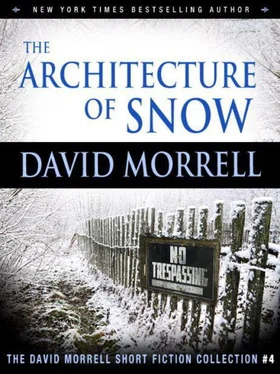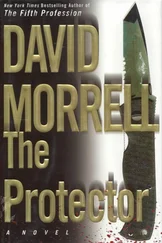David Morrell - The Architecture of Snow
Здесь есть возможность читать онлайн «David Morrell - The Architecture of Snow» весь текст электронной книги совершенно бесплатно (целиком полную версию без сокращений). В некоторых случаях можно слушать аудио, скачать через торрент в формате fb2 и присутствует краткое содержание. Жанр: Современная проза, на английском языке. Описание произведения, (предисловие) а так же отзывы посетителей доступны на портале библиотеки ЛибКат.
- Название:The Architecture of Snow
- Автор:
- Жанр:
- Год:неизвестен
- ISBN:нет данных
- Рейтинг книги:4 / 5. Голосов: 1
-
Избранное:Добавить в избранное
- Отзывы:
-
Ваша оценка:
- 80
- 1
- 2
- 3
- 4
- 5
The Architecture of Snow: краткое содержание, описание и аннотация
Предлагаем к чтению аннотацию, описание, краткое содержание или предисловие (зависит от того, что написал сам автор книги «The Architecture of Snow»). Если вы не нашли необходимую информацию о книге — напишите в комментариях, мы постараемся отыскать её.
The Architecture of Snow — читать онлайн бесплатно полную книгу (весь текст) целиком
Ниже представлен текст книги, разбитый по страницам. Система сохранения места последней прочитанной страницы, позволяет с удобством читать онлайн бесплатно книгу «The Architecture of Snow», без необходимости каждый раз заново искать на чём Вы остановились. Поставьте закладку, и сможете в любой момент перейти на страницу, на которой закончили чтение.
Интервал:
Закладка:
“Thanks, but I’ll take care of it.”
Determined to stake out my territory, I carried the package home. But I forgot about it until Sunday afternoon after I’d worked through several gut-busting boxes of submissions that included two serial-killer novels and a romantic saga about California’s wine country. The time-demanding tyranny of those manuscripts is one reason my wife moved out years earlier. She said she lived as if she were single, so she might as well be single. Most days, I don’t blame her.
A Yankees game was on television. I opened a beer, noticed the package on a side table, and decided to flip though its contents during commercials. When I tore it open, I found a typed manuscript, double-spaced in professional format. With unsolicited manuscripts, you can’t count on any of that. It didn’t reek of cigarette smoke or food odors, and that too was encouraging. Still, I was troubled not to find an introductory letter and return postage.
The manuscript didn’t have the uniform typeface that word processors and printers create. Some letters were faint, others dark. Some were slightly above or below others. The author had actually put this through a typewriter. It was a novel called The Architecture of Snow . An evocative title, I decided, although the marketing department would claim that bookstore clerks would mistakenly put it in the arts-and-architecture section. The writer’s name was Peter Thomas. Bland. The marketing department preferred last names that had easily remembered concrete nouns like “King”or “Steele.”
With zero expectation, I started to read. Hardly any time seemed to pass before the baseball game ended. My beer glass was empty, but I didn’t remember drinking its contents. Surprised, I noticed the darkness outside my apartment’s windows. I glanced at my watch. Ten o’clock? Another fifty pages to go. Eager to proceed, I made a sandwich, opened another beer, shut off the TV, and finished one of the best novels I’d read in years.
You dream about something like that. An absolutely perfect manuscript. Nothing to correct. Just a wonderful combination of hypnotic tone, powerful emotion, palpable vividness, beautiful sentences, and characters you never want to leave. The story was about a ten-year-old boy living alone with his divorced father on a farm in Vermont. In the middle of January, a blizzard hits the area. It knocks down electricity and telephone lines. It disables cell-phone relays. It blocks roads and imprisons the boy and his father.
“The father starts throwing up,” I told the marketing/editorial committee. “He gets a high fever. His lower right abdomen’s in terrific pain. There’s a medical book in the house, and it doesn’t take them long to realize the father has appendicitis. But they can’t telephone for help, and the father’s too sick to drive. Even if he could, his truck would never get through the massive drifts. Meanwhile, with the power off, their furnace doesn’t work. The temperature in the house drops to zero. When the boy isn’t trying to do something for his father, he works to keep a fire going in the living room, where they retreat. Plus, the animals in the barn need food. The cows need milking. The boy struggles through the storm to reach the barn and keep them alive. With the pipes frozen, he can’t get water from the well. He melts snow in pots near the fire. He heats canned soup for his dad, but the man’s too sick to keep it down. Finally, the boy hears a snowplow on a nearby road. In desperation, he dresses as warmly as he can. He fights through drifts to try to reach the road.”
“So basically it’s a Young Adult book,” the head of marketing interrupted without enthusiasm. Young Adult is trade jargon for Juvenile.
“A teenager might read it as an adventure, but an adult will see far more than that,” I explained. “The emotions carry a world of meaning.”
“Does the boy save the father?” the new CEO asked. He came from Gladstone’s broadcast division.
“Yes, although the boy nearly dies in the process.”
“Well, at least it isn’t a downer.” The head of marketing shook his head skeptically. “A couple of days on a farm in a blizzard. Feels small. Bestselling novels need global threats and international conspiracies.”
“I promise-on the page, those few days feel huge. The ten-year-old becomes the father. The sick father becomes the son. At first, the boy’s overwhelmed. Then he manages almost superhuman efforts.”
“Child in jeopardy. The book won’t appeal to women. What’s the title mean?”
“The epigraph indicates that The Architecture of Snow is a quote from an Emerson poem about how everything in life is connected as if covered by snow.”
The CEO looked bored. “Has anybody heard of the author?”
“No.”
“A first novel. A small subject. It’ll be hard to persuade the talk shows to promote the book. I don’t see movie potential. Send the usual rejection letter.”
“Can’t.” I felt on the verge of risking my job. “The author didn’t give a return address.”
“A typical amateur.”
“I don’t think so.” I paused, about to take the biggest gamble of my career. But if my suspicion was correct, I no longer needed to worry about my job. “The book’s beautifully, powerfully written. It has a distinctive, hypnotic rhythm. The punctuation’s distinctive also: an unusual use of dashes and italics. A father and a son. Lost innocence. The book’s style and theme are synonymous with. .” I took the chance. “They remind me of R. J. Wentworth.”
The CEO thought a moment. “ The Sand Castle ?”
“We sold eight million copies so far, a hundred thousand paperbacks to colleges this year alone.”
“You’re suggesting someone imitated his style?”
“Not at all.”
“Then. .?”
“I don’t believe it’s an imitation. I think Peter Thomas is R. J. Wentworth.”
The room became so quiet, I heard traffic outside twenty stories below us.
“But isn’t Wentworth dead ?” a marketer asked. “Wasn’t he killed in a car accident in the sixties?”
“Not exactly.”
October 15, 1966. Three disasters happened simultaneously. A movie based on one of Wentworth’s short stories premiered that month. The story was called “The Fortune Teller,” but the studio changed the title to “A Valentine for Two.” It also added a couple of songs. Those changes confirmed Wentworth’s suspicions about Hollywood. The only reason he sold the rights to the short story was that every producer was begging for The Sand Castle and he decided to use “The Fortune Teller” as a test case. He lived with his wife and two sons in Connecticut. The family begged him to drive them into Manhattan for the premier, to see how truly bad the film was and laugh it off. En route, rain turned to sleet. The car flipped off the road. Wentworth’s wife and two sons were killed.
The film turned out to be dreadful. The story’s New England setting became a cruise ship. A teenage idol played the main character-originally a college professor but now a dance instructor. Every review was scathing. Nearly all of them blamed Wentworth for giving Hollywood the chance to pervert a beloved story. Most critics wrote their attacks in mock Wentworth prose, with his distinctive rhythms and his odd use of dashes and italics.
Meanwhile, his new book, a collection of two novellas, Opposites Attract , was published the same day. March amp; Sons wanted to take advantage of the movie publicity. Of course, when the date was originally chosen, no one could have known how rotten the movie would be. By the time rumors spread, it was too late to change the schedule. Reviewers already had the book in their hands. It was charming. It was entertaining. In many places, it was even meaningful. But it wasn’t as magnificent as The Sand Castle . Anticipation led to disappointment, which turned to nastiness. Many reviewers crowed that Wentworth wasn’t the genius some had reputed him to be. They took another look at The Sand Castle and now faulted passages in it .
Читать дальшеИнтервал:
Закладка:
Похожие книги на «The Architecture of Snow»
Представляем Вашему вниманию похожие книги на «The Architecture of Snow» списком для выбора. Мы отобрали схожую по названию и смыслу литературу в надежде предоставить читателям больше вариантов отыскать новые, интересные, ещё непрочитанные произведения.
Обсуждение, отзывы о книге «The Architecture of Snow» и просто собственные мнения читателей. Оставьте ваши комментарии, напишите, что Вы думаете о произведении, его смысле или главных героях. Укажите что конкретно понравилось, а что нет, и почему Вы так считаете.












